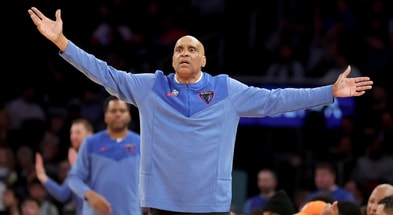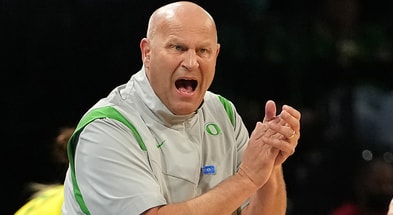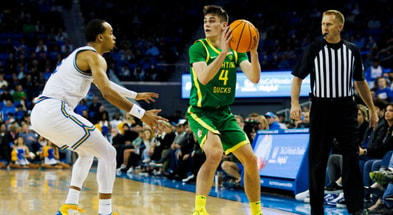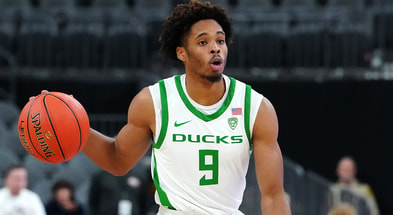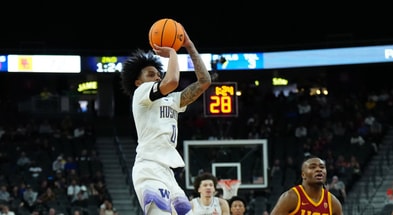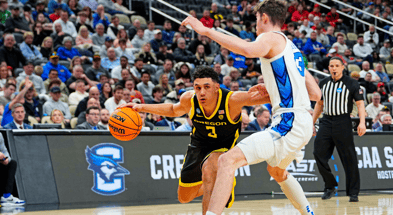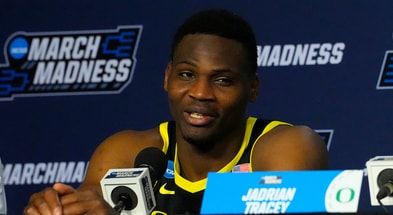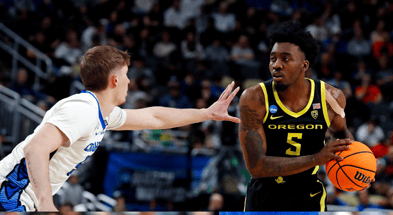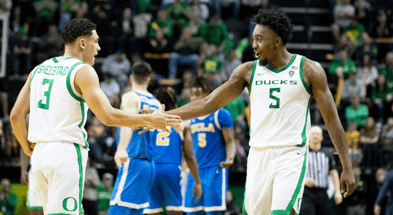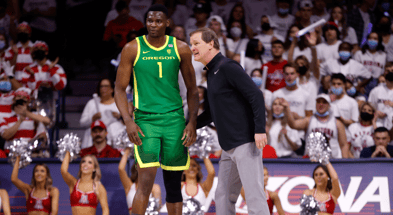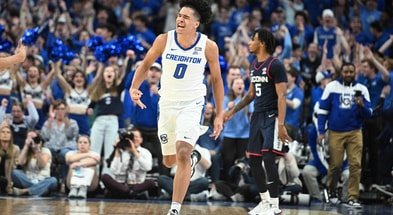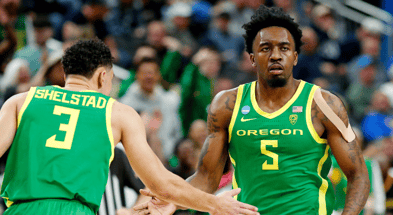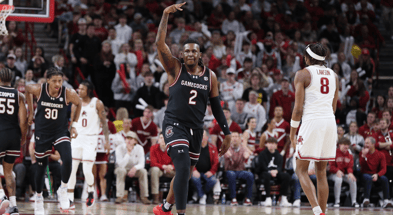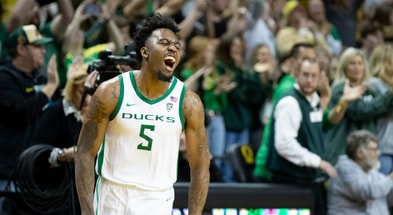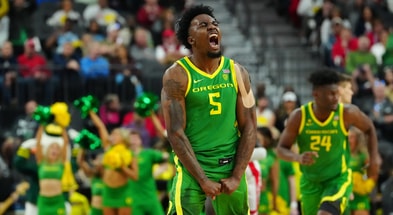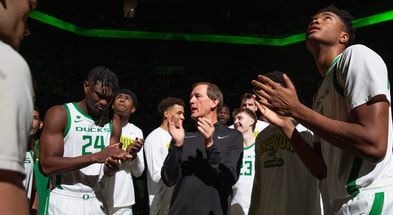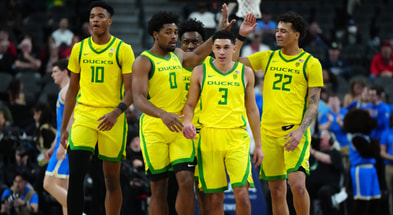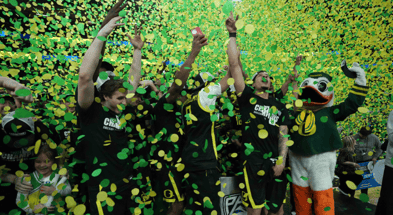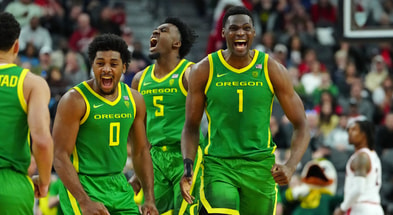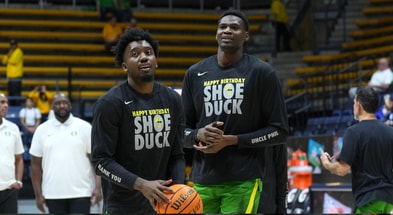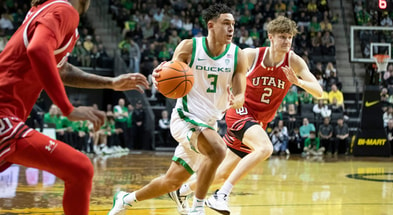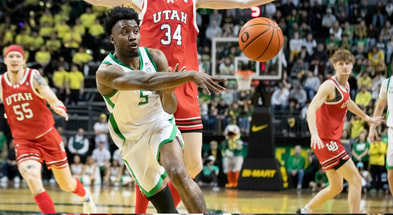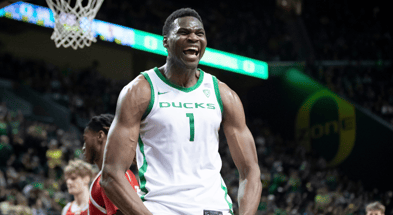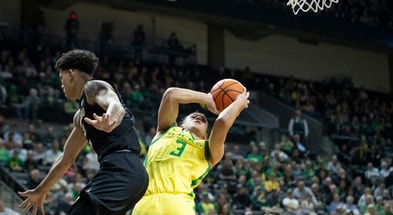Everything Greg McDermott, Creighton players said ahead of Saturday's showdown with Oregon
Ahead of Saturday’s showdown with the Oregon Ducks, Creighton head coach Greg McDermott, senior guard Steven Ashworth, senior center Ryan Kalkbrenner, and senior guard Francisco Farabello met with reporters.
Here is a full transcript of everything that was said during their press conference.
Q. Just curious what you guys, what your impressions were of watching Oregon yesterday and studying them a little bit on film and kind of going through some of their tendencies?
RYAN KALKBRENNER: Yeah. They’re obviously a really, really good basketball team. Looking specifically at my match-up against their big man, he’s a really, really good player, really big, really physical, good touch around the rim. So we definitely gotta be locked in and prepared for this team, but I think if we do what Mac asked us to do and do the game plan we put out there, I think we got a good chance.
FRANCISCO FARABELLO: Yeah, super talented basketball team. There is a reason why they’re here, they won the Pak 12 tournament. One of their players dropped 40 the other day. So that’s not a minor factor. But, yeah, as Kalk said, like we’re going to have a plan. I feel like we’re going to be ready for them.
STEVEN ASHWORTH: I think I noticed that they play with a lot of good pace, a lot of athleticism on the court, and they have a few different defenses that they like to throw at teams. And so gotta continue to study film, see where our match-ups bode well against them and those type of things on defensive end and offensive end and just enjoying the journey and looking forward to another chance to play another basketball game.
Q. Steven, you faced these guys back when you were at Utah State a couple of years ago in the NIT. Schematically, what they do defensively particularly really doesn’t change much even though the names and numbers might. What do you remember of some of that and what from what you’ve seen on tape so far applies about their defense, what makes it difficult from a match-up zone standpoint?
STEVEN ASHWORTH: They have a lot of athleticism and a lot of length. When you have perimeter guys that can get a lot of deflections and run out into transition, it fuels their offense. And I remember playing them in NIT at Utah State that was really what hurt us in the second half of that game. I believe we had the lead at the first half but at the second half they really came out and were aggressive and extended that zone. And so spacing is a key against all of that, making sure you keep your spacing and keep your movement because when teams get stagnant and pushed up the floor, they’re really, really hard to score against.
So those are some of the things that I remember, and yeah, there’s different teams and we’re a completely different team than I played with at Utah State. So excited about it, but those are some of the things that I think are similar to years past.
Q. Ryan, I’m just curious, because of your defensive prowess, I’m sure teams try to pull you out away from the rim a lot like Akron did yesterday. Is that pretty common and how do you guys usually counter that?
RYAN KALKBRENNER: Yeah, if the other team has a big man that can shoot they definitely use that to their advantage and pull me out and stretch our defense out a lot. As far as how we counter that, it’s pretty match-up based for what the other team has as far as like other players on the court. We’ve done a few different things throughout the year, trying to figure out what works best for us when we play against teams like that. But I think as we’ve gotten later in the year, we’ve made certain adjustments and come up with certain game plans that work a little better for us than we have had at the beginning of the year. So I like where we are with teams that can play with a big man that can shoot. So, yeah, definitely changes what we would like to do, but we’ve definitely made adjustments throughout the year.
Q. I know Coach Altman’s time at Creighton predates most of your lives. I was just curious if you’re aware of his legacy there and does Coach Mac talk at all about what Dana did and how he helped build Creighton into what it is now?
RYAN KALKBRENNER: Yeah, Mac does bring him up every now and then. Coach Altman definitely laid the foundation for where the program is today. When Mac took over he built upon what Coach Altman had already done there. Obviously he was really successful at Creighton. So we have a lot of respect for him as a coach and what he’s doing over there at Oregon now, too.
Q. Guys, I was talking to Sterling the other day about being the hype guy or whatever, the handshake dude at the end of the line. I was sort of curious, and I’ve talked to players at other teams that have that same sort of responsibility. I mean, what kind of energy does that bring? He talked about the dances he tries to get you all to do or whatever. What kind of energy does that bring to the group?
STEVEN ASHWORTH: I mean, I think it brings followers, is the first thing, all the dances Sterling tries to get us to do. He’s just a joy to be around, is a kid that is always having a smile on his face and is trying to lift up others and he’s got talents on and off the court and he tries show those and I think it gives us all a good boost of energy when he’s doing that.
Q. (No microphone).
FRANCISCO FARABELLO: I’m not from here, and that’s not something that we do overseas, but I respect it. Yeah, I mean, what Steven said. The season gets really long and it’s good to have guys like that that just the simple fact by just dancing they can lift your energy up. So it’s a joy to be around him.
RYAN KALKBRENNER: Yeah, like these guys said, I mean, it’s always matched up guys on the team who are just having fun and bringing good energy. Even when Sterling is red shirting, so he’s not playing, but he’s still bringing really good energy to the team. So guys like that are awesome, him, Sami, Brock, Shane, gosh, all those guys have done a great job all year bringing good energy.
Q. For the guards, Francisco mentioned Oregon who has a player who had 40 points yesterday. Just to follow up on that, when you’re game planning and preparing for a team with a guy who just did that, does that — do you focus more on him or do you — are you concerned that like if you focus too much on one player, then other people might be left open and have a hot night of their own?
STEVEN ASHWORTH: Yeah. I think that’s a very fair question and I think, especially at this stage, there’s only 32 teams left, so every team out here has really talented players, and if you start to focus too heavily on just one person, I do think that others can tend to hurt you in ways that you weren’t quite prepared for. So I think we’re really trying to do a good job of holistically looking at their group and understanding at the same time that he’s in a really good rhythm and finding ways that we can maybe counteract that as well as just continuing to see how our defense and how our style might give them problems as well before we try to adjust too much to what they do really, really well.
Q. Ryan, you mentioned Oregon’s big man, Dante. He got to the free throw line 15 times yesterday. I’m wondering just for you, when you have a match- up like that, that there’s going to be a lot of contact, he’s going to be living in the paint, what are the challenges for you going up against a guy like that and in particular just trying to defend him cleanly and staying out of foul trouble?
RYAN KALKBRENNER: Yeah, I mean we know, obviously, watching the game yesterday he shot a lot of free throws. They’re probably going to try to do that again, get me in foul trouble and whatnot. I feel like, especially in the Big East, we played a lot of bigs who were super physical like that, a lot of bigs that were, not necessarily trying to draw fouls, but there’s going to be a lot of confrontations at the rim. So I’ve gotten a lot of practice this year at trying to stay out of foul trouble. I think I’ve done a pretty good job so far. So I’ll just try to do that again. But like I said, he’s a really talented big man, super physical. So I’ll have my hands full, for sure, but I’ll try my best.
Q. To follow up on that, I don’t know if you saw the end of the Kansas game last night, but there was a call at the rim at the end. Do you think there should be a capacity for fouls to be reviewed at any point?
RYAN KALKBRENNER: That seems like above my pay grade to be thinking about ref rules. I just try to play the game the way the rules have it as it is now. If I become a coach one day then I’ll start thinking about those types of things.
Q. That’s a coach-type answer, so I appreciate it.
Q. You guys have collectively played — Ryan, you’ve played the most NCAA games in Creighton history. You guys have all played in a bunch now. How do you like when you go into a situation like this, it might feel normal to you, but it’s not to maybe everybody else watching. How does your experience kind of play itself out, manifest itself in an NCAA Tournament game?
STEVEN ASHWORTH: Yeah, this is my third opportunity to play in March Madness, and so I think that there is a lot of advantage to somebody who’s been in situations like this before, played a lot of postseason games and understand what’s at stake, but also at the same time that you can’t get too caught up in the moment. You have to be present and do what’s now. And then, also, it’s just from my perspective, it’s a joy playing with guys like this that have that experience as well that we can all lean on each other and trust each other in big-time moments, and seems like time and time again people are ready to deliver. So that’s a testament to the team we have as a whole just being ready to go, and it’s something I think that we’re using well to our advantage this year.
FRANCISCO FARABELLO: Yeah, like you said, it’s not normal, like not a lot of players get the opportunity to play where we’re playing right now. And, of course, there is excitement. But I mean, I remember Coach Mac yesterday before the game, like players tend to let the excitement take on their game, you know, speed them up. But we try to be as calm as we can, you know. The most important part at the end of the day is just having fun and enjoying it, and I think we’ve been doing a pretty good job with that so far.
RYAN KALKBRENNER: Yeah, I think once you play in this tournament a time or two, you start to find a balance of like having urgency and playing free. Like Bello said, it’s easy to get sped up in these moments and think you gotta go and try and do too much, especially when you have three, four plays in a row that don’t go your way. But once you get some experience, you can kind of slow down and find that balance of, you know, okay, it’s time to maybe be a little more locked in because we’ve had a few things not go our way but not do it too much to where you start messing up because you’re trying to do it too much. So I think the experience helps a lot finding that balance.
Q. Francisco, since you’re not from Nebraska, how did Creighton find you or how did you find Creighton?
FRANCISCO FARABELLO: Very different than what I was used to. I played three years at TCU and Fort Worth is a lot different than Omaha, the DFW area just in general. But I’ve been asked that question these last two months since it’s my senior year, and that’s it. I loved it. I loved it since — the first day since I stepped foot on campus, I loved it. The Creighton community is incredible, and I’ve been saying this. I’ll probably never be part of something as big as Creighton basketball. And I enjoyed, and I’m enjoying as much as I can.
Q. (No microphone).
FRANCISCO FARABELLO: I had no idea. No. The first time that I heard it was I was playing in Australia, and one of my teammates, Sam Froling, he was getting recruited by Creighton, but still like even when I committed to TCU, I had no idea what Creighton was and where it was. But as I say, I loved it every moment.
Q. This is for any or all of you guys up there, and bear with me. It’s not about the game tomorrow. But I’m wondering if any of you guys caught anything of the Kentucky-Oakland game after you guys wrapped up. One of their players, Jack Gohlke, kind of just came out of nowhere, drained ten three-pointers. That was one short of the all time NCAA record for three-pointers. What I’m getting at is, for you guys being here at March Madness, is this an opportunity — do you guys have the ability to just take a step back and just appreciate a performance like that or are you guys kind of just so locked in on yourselves that maybe you’re not all that concerned even when there is like a super crazy historic performance like that?
RYAN KALKBRENNER: Yeah. I did watch some of that game, and I think even when you’re a player playing in the tournament, you can take a second and go like, wow, that was really crazy what they did. Probably not taking it in as much as I will in the future when I’m watching it as a fan, but you definitely see it and just go, like, wow, that’s kind of crazy.
MODERATOR: All right. Questions for the student-athletes. All right. Thank you.
MODERATOR: Questions for Coach McDermott.
Q. Mac, I know you guys have kind of a cheat code of yourself in the middle there. What you’ve learned about N’Faly Dante and shooting 84 percent over his last seven games and high volume, what kind of challenge do you think that’s going to present tomorrow?
GREG McDERMOTT: Yeah, he’s terrific. And you look at their team with him versus without him, this is a team that’s grossly under-seeded. If Dana had this group of guys available all season long, he wouldn’t have needed to play in the PAC-12 Tournament to win it to get in the NCAA Tournament. He would have had a very good seed. And they’re playing great basketball right now. Dante impacts the game on both ends of the floor. He’s very physical at the rim offensively, and then he’s a tremendous rim protector on the other end. And his physicality is obviously going to be a problem for us.
Q. Looking at the tape yesterday of Couisnard, what jumped out at you and the way he got to his 40 points, and how are you like balancing dialing in on him versus not leaving some of his teammates open in the back court?
GREG McDERMOTT: I mean I don’t think you ever want to overreact to a crazy outstanding game by a player. I think everybody has them. Not many have them like the one he had yesterday on this stage. But he scored at every level yesterday, and we have to make sure that the best we can get him to take the shots that we want him to take, not the shots that he wants to take. And that sounds easy in theory. It’s very difficult because of his size and strength and the pace that he plays with. When he’s making three-point shots at a level like that, it’s very problematic because of all the other things that he can do. But we’ll give him some different looks. We’ll put some different guys on him, probably mix up our ball screen coverages so he doesn’t get comfortable. But he’s a terrific player and he’s had the game of the tournament so far.
Q. Greg, how has your relationship and friendship with Dana evolved since you took over for him and is it a little surreal to be going against him in this situation on this stage?
GREG McDERMOTT: Yeah, I mean, it’s quite a history. I took the Wayne State job in Wayne, Nebraska, Division II school in 1994. I think Dana started at Creighton in ’92. And I watched him kind of build the program in the early years, and then took the Northern Iowa job in 2001 and then I competed against him with Korver and Tolliver the great teams he had. At that time you’re competing and you’re recruiting against each other and you’re probably not going to dinner together, but we’ve always had respect for each other.
And then when I moved to Omaha, first of all, he recruited Doug right before he left, and he’s a cheater, to start, because he took me to play golf, him and Bruce Rasmussen the athletic director at the time. They gave a couple of phony handicaps. I totally lost the game on the first tee and I ended up paying them. Usually, the dad of a recruit is probably not going to have to pay the head coach after the golf round, but that was the case that particular day.
But since my time in Omaha, now a lot of my very close personal friends are also people that were very close personal friends of Dana when he was in town. And you learn a lot about someone by talking to their friends and how he treated people. Dana’s family is still very close to our program. His father, Lyle, until his health deteriorated a little, and his brother, Dirk, would come to our monthly basketball luncheons with their Creighton gear on and support us through everything. And I’ve said hi to Dirk yesterday actually walking off the floor.
So I think we’ve developed a friendship as a result of that. And I’ll get a text from him after a big game. He’ll get one from me once in a while. But very high level of respect for the job that he did. And when you take over a program, I’ve always felt it’s important to embrace your history and make sure that our players understand the work that the people that came before us did. And certainly, Dana’s era of him as a coach and the guys that played for him laid the groundwork for me to happen and Doug to happen and the Big East to happen. None of that is — that’s a pipe dream without Dana Altman. So he’ll always be beloved in our community. I know this will be a hard game for some of our fans tomorrow, because they cheer for Dana absolutely every game.
So it’s interesting that we ended up in the same bracket, but the good news is one of us is going to go on and I guess the bad news is one of us is going to have to go home.
Q. Greg, these are also instances where we usually get to reflect and look back at years where we don’t necessarily do 14 years later. When you were taking over because you were taking over after some success from him by comparison to what he was taking over at Oregon, can you reflect back at what that 2011 CBI match-up at that time in going back and forth, what that meant, and as you went about instilling a culture there after success and then at the end of that season, oh, yeah, by the way, now you have to face the former coach and the former players?
GREG McDERMOTT: It was a fricking nightmare is what it was, to be honest. That’s the last thing you want to do as the new coach who’s replacing a guy who’s beloved by everybody and has unprecedented success is we’re going to go to this tournament that neither one of us want to go to, and you look at the bracket and you’re on opposite ends and of course we win all of our games and they win all of their games and the next thing you know we’re in the three-game series with Oregon.
I think we were probably responsible for getting the line on the floor at half court, because we got beat in Game 3 in a tie game. My point guard is out at half court getting setup on the offense. And he’s somewhere standing on the trees at half court and the referee has better than 20/20 vision because somehow he picked out that his heel was on that little broken line that went through the forest, and he called an over and back, and then we got beat on a shot at the next end.
But it was an interesting way to end that first year. But you could see at that time already that Dana was instilling in the Oregon program the way he wanted things done. And we had inherited a group of seniors. That team for me was really five or six seniors and then five or six young guys, which was Doug’s freshmen class. But he had really good dudes that he had recruited to that program. And those six guys, five or six guys, those seniors, why we didn’t win as much as we would have liked to that year, they really instilled what we wanted the standards and the culture that we were trying to get the program to be moving forward.
Q. Mac, I know this isn’t going to affect the prep or certainly not going to be present in your mind when the game gets tipped off, but with Ras here in Pittsburgh watching the only two head coaches that he hired for men’s basketball go out it in the 30 years he was the athletic director, is that going to mean anything to you?
GREG McDERMOTT: I mean, Bruce Rasmussen means everything to me, and I’m sure Dana would speak about Bruce in a very similar way. Besides being our boss and the guy that gave us an opportunity, he was a mentor to me and became a great friend, and still a great friend today and a mentor today. And I think you become, as you go through this journey of life, I think you become a lot of what the people around you are like and what you learn from them. And I think you can see a lot of what’s happening in Oregon’s program and our program and the way that people are treated is probably a direct result of Dana’s relationship and my relationship with Bruce because of what we learned from him and his ability to have absolutely no agenda for himself. It’s always about somebody else. And simply, it’s why the culture that he created, you know, still exists at Creighton, it’s why you have Debbie Conry, our women’s golf coach, has been there 31 years; Tom Lilly, women’s tennis, 27 years; Dan Chipps, rowing, 24 years, Jim Flanery, women’s basketball, I think 22; and then I think Coach Servais in baseball and Kirsten in volleyball have been 20 or 21 and I’m at 14. Like, that’s half of our staff, and we’ve been there forever. And it’s because of the culture that Bruce has created, and now Father Hendrickson and Marcus Blossom, just like I carried the torch from Dana, they’re carrying that torch for Bruce. It’ll be bittersweet for him tomorrow. He assured me last night, though, that this is Bluejays all the way.
So I haven’t seen him face to face, but he made it clear in a late-night text because neither of us sleep after a game, so he just wanted to make sure this was — I’m supposed to kick Oregon’s ass, as he said (laughs).
Q. What did you shoot that day and what did Dana shoot?
GREG MCDERMOTT: Well, I don’t know what the scores were, but I know the cash exchange afterwards was not in my favor. But, no, they took me to Omaha Country Club, and you’re thinking, God, they really want my kid, this oughta be a profitable day. You know, technically would have been NIL before there was NIL should I be fortunate enough to win. But I was not fortunate enough to win. I felt like I got double teamed, actually, that day. But we had a great day, and it was — at that time, I was still coaching at Iowa State. So that was Doug’s first exposure to Creighton, and obviously he really liked it. So when I ended up taking the job, he got out of that Northern Iowa deal, and the rest is history.
Q. And Ryan was saying that you do share with them kind of the groundwork that you were saying that Dana laid there. What specifically did he do? I know you were kind of watching it from afar, but those imprints that you still see now in the program.
GREG McDERMOTT: I mean he recruited the right kind of guys. And there was a culture of family in his program then, and you can tell that because a lot of his former players, a bunch of them live in Omaha, or they’re constantly coming back to Omaha for our games or in the summertime and they’re stopping by the practice facility.
The former players don’t do that unless they enjoyed their experience, unless they were treated the right way. And obviously they had success, and that certainly helps. But Dana did it with team after team. He’d lose guys, but Kyle Korver and Anthony Tolliver, the two most recent guys from Dana’s tenure that played in the NBA, what better representatives of an institution and of a program than Kyle Korver and Anthony Tolliver. And I think that gives you a snapshot into the type of people Dana brought into Omaha into the Creighton program.
Q. Would you be in favor of any sort of potential review system on fouls, maybe particularly late in games or the game’s already sort of drawn out enough that the call is the call and that’s it?
GREG McDERMOTT: No, I probably — I hadn’t thought about that. I understand why you’re asking. I saw the play last night. I would probably want to talk to the NBA guys and get a feel from them on whether they like it, don’t like it. It seems like we go to the monitor a lot the way it is right now, and we’re trying to figure out a way to kind of keep our game moving along and make it more fan friendly. And would that slow it down potentially? I mean we all have video on the bench that’s instantaneous, basically. So when we go to a challenge, we pretty much already know the answer.
But are we going to challenge traveling? Are we going to — I mean, what’s next? Where does it stop? There’s always been a human element in the game, and I don’t think we want three robots out there running around officiating a game.
So I don’t know. I’d want to talk to some of our peers in the NBA to figure out if they feel like it’s been a good thing for their game. Anything that’ll improve the game, absolutely. But let’s give it some thought first.
Q. You called Oregon an under grossly seeded team. I don’t know how far back in the scout you went, but what are the traits that you’re seeing to have that kind of feeling towards this team?
GREG McDERMOTT: Well, you know, Couisnard and Shelstad are playing at a high level. And Dante is the — he’s a difference maker, right? When he’s on the floor, he just — he commands so much attention on the offensive end because you can’t — can’t guard him one on one and we’ve got one of the best defenders in the country and I’m not sure we can guard him one on one. And defensively he, sits back there and he impacts shots. Like Kalkbrenner there’s a shot you block, there’s the shots you change which don’t show up on a stats sheet and the ones that really don’t show up on the stats sheet are the ones you don’t take because he’s there. And he has that impact on their opponents.
And Arizona is a heck of a team. I think they’re a team that’s got a chance to be a Final Four team, and that 12, 15-minute stretch from the end of the first half till eight minutes left in the game they just dominated Arizona. And I think you saw that on display again yesterday.
Q. Could you maybe compare the mood, the feeling at this stage right now compared to exactly where it was last year going into that Baylor game, maybe there’s still a feeling of, hey, we’re going to really break through and get to the Sweet 16? I know you’ve been to one before that. How does it feel right now with the past success that you had last year?
GREG McDERMOTT: I think every year is different. The hard thing to do is to get here, and then you just take it a game at a time and you try to get through that first one and survive. And then you have two long days of prep, and you’re trying to get to the second one. So I don’t think — I don’t think our guys feel any pressure to get back to Sweet 16 or Elite Eight or Final Four. I think their focus has been let’s let this thing rip, let’s give it our best shot and let’s see if it’s good enough, and if it is, great. If it’s not, we’ve got nothing to hang our head about. We’ve had a heck of a year and done a lot of great things. And frankly, I don’t want them to feel that pressure. That type of pressure is only going to be a hindrance to where we’re trying to go. It’s not going to help us. That’s for fans to think about, but we can’t think about that in our locker room.
Q. Greg, a bit of a two-parter on each end. Defensively what is it about their match-up zone that’s a unique challenge compared to others, and offensively, what is it about the pick and roll with Couisnard and Dante that, yes, they’re very old players, a 25-year-old guard and fifth year center, but what is it about their connection that makes it a difficult aspect when so many teams run pick and roll?
GREG McDERMOTT: Yeah. You know, the match-up, a lot of teams — there are some teams that we’ve played against in our league that play it, but it’s more — they play it more as a change-up. And because they play it more as a change-up, the amount of time they probably commit to it in practice is probably minuscule compared to what their other defenses are. It’s an important part of Dana’s defensive plan. It always has been, ever since I first coached against him in 2001. So 23 years I’ve seen it. It’s an important part of what they do. And as a result, their guys are really good at it.
You know, there’s not a pattern to it that you can unlock. It’s elite communication. It’s great length. It’s covering each other. It’s communication that makes it really good. And then, oh, by the way, if we make a mistake we got Dante back there at the rim. So that’s what makes that really good.
And then the ball screen, I think Couisnard is one of the best that I’ve seen in the country in a ball screen situation, and we call it a hostage dribble where you get the guy in your back and you kind of keep him there and then read a situation. He’s strong enough, he’s physical enough, he’s crafty enough to get a guy in his back and then decide am I going to dump it to Dante, am I going to go mid range or try to get to the rim. And you have to respect his three-point shot at the point of the ball screen. So it’s not like you’re going to jump under the screen, because he can light you up with a three-point shot.
And then Dante is such a physical roller, and he can get behind the defense and you can lob it up to him. So you’re trying to commit to Couisnard and slow him down, but in the back of your mind I gotta get back to the rim or we’re going to get dunked on. So they’re elite at it. And we’ve got some guys, Trey Alexander and Ryan Kalkbrenner are pretty good at it, too. They’ve been together a long time and they’ve done it, and like Couisnard, Trey has that mid-range game and the shiftiness to do some different things. But it’s definitely a problem. I’m not sure if we had five days to prep it’s going to look any different than it will tomorrow, but we’ll give it our best shot.
Q. I don’t know how many teams in the country like yours do have three guys that average four or more assists. Can you just speak to the play making ability that you guys have and how that’s impacted your offense being one of the best in the country?
GREG McDERMOTT: It’s what we build our program on. We may not have as many guys that touch the top of the square as some other teams we’re going to play, especially this time of the year. We value skill. We want guys that can handle it, pass it, shoot it and understand how to play the game. And then we’ll help you with the other stuff.
And guys come into our program understanding that we talk about it in recruiting, like we are going to turn a good shot into a great shot. And the last thing you want to do is be the only guy on the team that’s willing to turn a good shot into a great shot because it never comes back to you. But our offense is such that the ball will find you if you play the right way, if you move the basketball, you make the extra pass, you cut with pace, you stay spaced at times when your teammates are in action, our offense will reward you because the ball will find you. So it’s really intentional in recruiting that we have guys that are more than willing to make that pass. It’s what we built the program on and what we will continue to build it on moving forward.
MODERATOR: Thanks, Coach.
GREG McDERMOTT: Thank you. Somebody made a mess over here. (Laughs).
